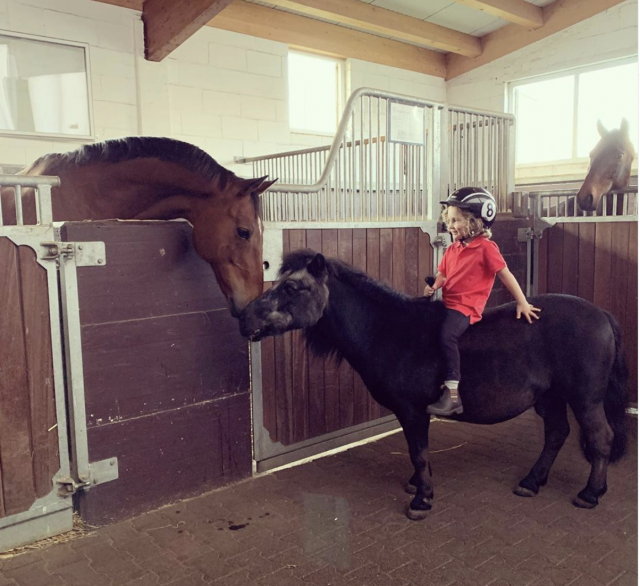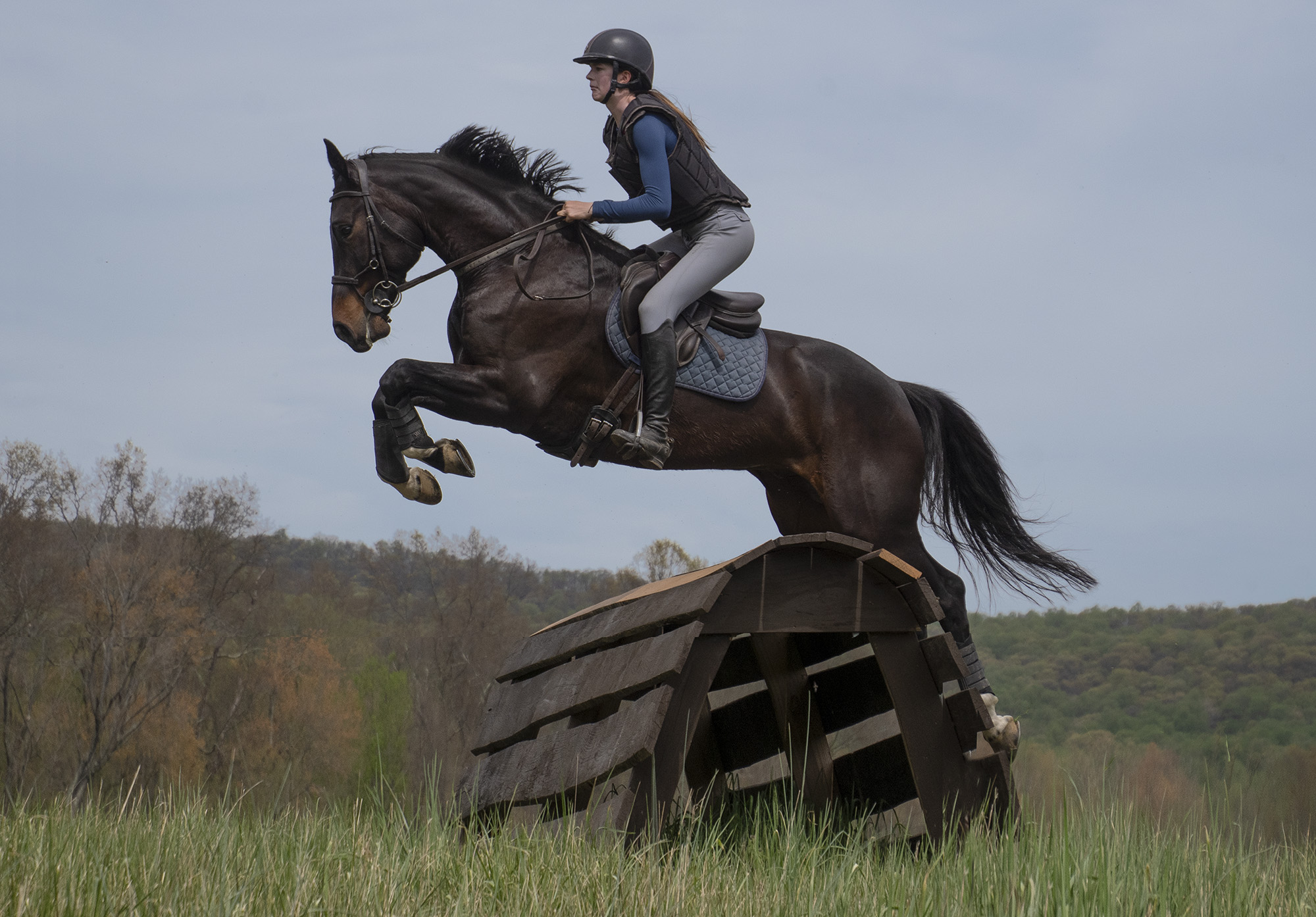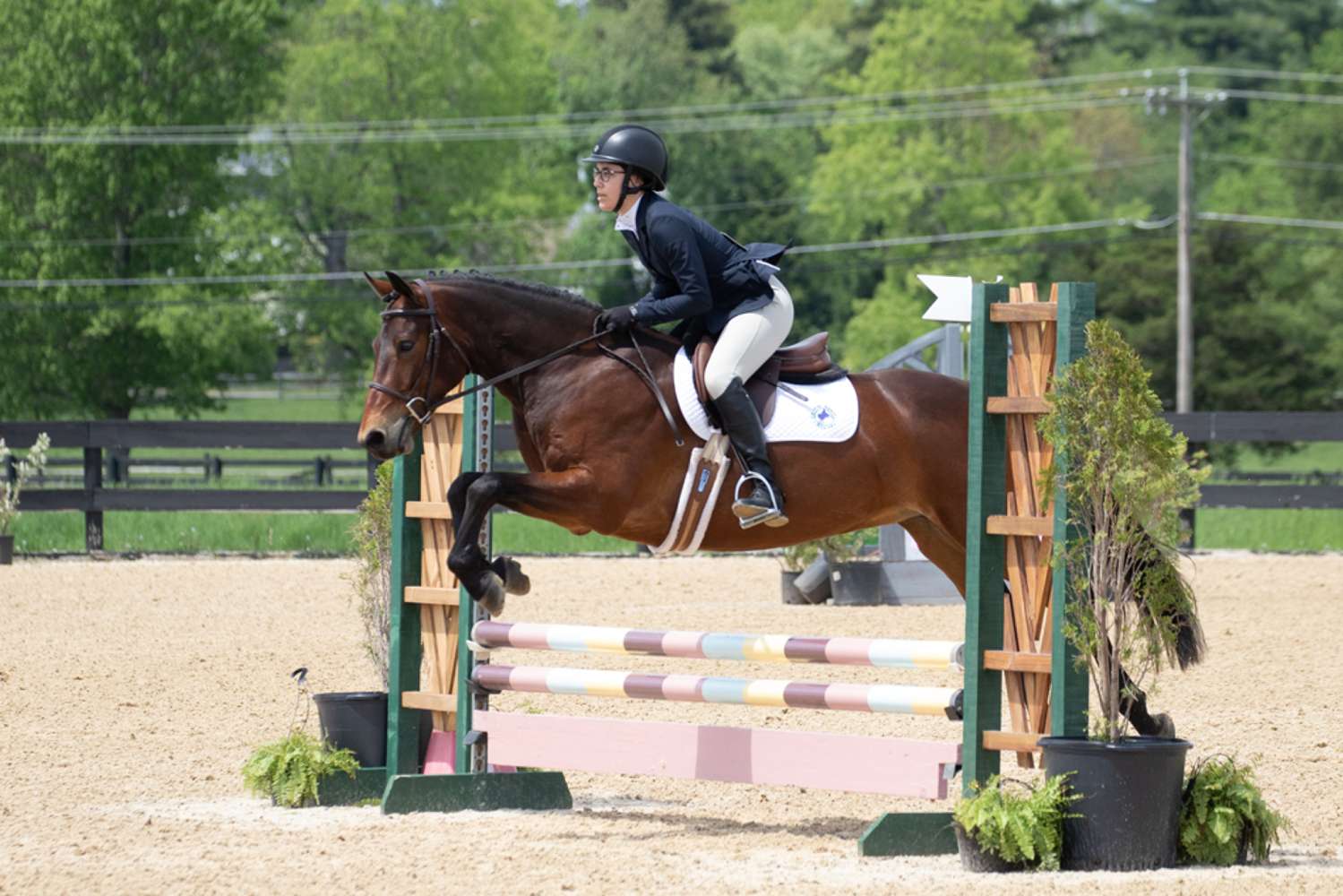
Please get in! Pretty please! Photo by Shellie Sommerson.
There is almost nothing worse than your horse not getting on the trailer when you need to be somewhere on a schedule and … your horse simply will not cooperate. Ugh!!! What steps can you take to keep this from happening in the future?
Most trailer loading issues really have nothing to do with the trailer. The problems start with ground manners or lack thereof and your inability to direct your horse’s feet. You need to be able to influence your horse’s feet to move in the direction you want. Don’t plan to work on trailer loading skills when you need to be somewhere within a certain time frame. Practice when you are not in a hurry.
So, how do you resolve trailer loading issues?
Tools: Rope or leather halter, lead rope (about 8 to 12 feet long) and gloves.
It is really important that your horse respect and respond to you but NOT be afraid or reactive! A respectful and responding horse will move methodically. A scared and reactive horse will move quickly and unexpectedly – not safe for either of you!
Your focus should not be on getting the horse in the trailer but your horse staying out of your personal space, you being able to control the direction of his feet and you being able to touch him (even when he may not be able to see you). In your mind, remove the goal of getting your horse on the trailer as this will inhibit progress.
Personal Space
Does your horse get in your space? Bring his head over toward you, crowd you with his shoulder and/or turn away?
The first step is to teach your horse to stay out of your personal space. Think of a circle, like a hoola-hoop that stays around you. Your horse should not enter that space unless invited into it. If he breaks that rule, deliver a little bump on the lead line. A bump, not a jerk. Remember, your feet should NOT be moving backward/forward! But his feet should move! When he starts to give you the right response, stop asking – stop the queuing – when you stop queuing that tells him he is doing what you want. Practice this in both directions. Your goal is to have a horse that keeps the ‘distance’, follows the lead line around the circle without pulling or cutting in, and continues stepping forward until you ask him to stop. And this leads you into the next step – Managing the feet.
Managing the Feet
Your horse’s feet, NOT your feet! You need to be able to control your horse’s feet forwards and backward in a straight line. A great exercise is to line your horse up next to a fence line (I should not need to say this – but please stay away from wire fences). Teach your horse to step forward one step at a time and backward one step at a time off very slight pressure on the lead line. If your horse gives you a hint or thought of the direction you ask, then stop asking when he starts trying. It is VERY important to release the pressure as SOON as your horse even starts to give you the response. You control the number of steps in each direction. The goal is for your horse to stay straight, that is where the fence line comes in handy. Work on this from the off-side and the on-side. Once you are successful at this exercise, then move off the fence line and practice this in the open. Practice this exercise facing your horse with your focus (energy, if you will) is on his hind feet (the motor). If you can draw your horse forward and step him backward, then you can walk him up to the trailer and do the same whether you are beside him or facing him. That brings us to the third skill – Touching.
Touching
Get your horse comfortable being touched on his sides, hips, backs of the legs – this will come in handy when you have to do anything behind the horse (butt-bar, etc.) where he may not be able to fully see you. This is a huge piece for safety! Your horse needs to know that he is safe with you, even if they cannot see you – ever so important with trailering. He needs to know that you are not a threat and trust that you are not putting him in a threatening environment. A relaxed horse is the goal.
On to the Trailer
When working at the trailer, put your trailer in an area where the footing is good. Parking in a vacant paddock is great (close the gate just in case your horse happens to get away from you); stay away from gravel and pavement if you can as bad footing can add an element of distress or discomfort.
As a reminder – your initial goal is NOT to get your horse in the trailer; that will come. Your goal is to be able to accomplish the above exercises. In your first session, plan to introduce your new method to your horse, practice the exercises and breath. The number of sessions you and your horse need will depend upon how well you two are able to do the exercises, and how well you can keep your emotions out of the mix.
Whether your trailer is a front-load or a side-load, the guidelines remain – Personal Space, Feet and Touching. Begin with leading your horse up to the trailer near the opening to let your horse investigate. When he investigates, he needs to stay near the trailer and fairly ‘lined’ up. Reward him with a pause/rest and a scratch. If he steps sideways without being rude, that is okay, just queue him to come forward and straight (even if it is a forward thought or a shift in his body weight forward). Once he starts to think forward relax your queue Thinking forward when asked is the key and that is VERY important for you to be good with your timing – stop asking when he starts trying. Then let him rest or pause. If he backs up, go with him, then queue him to step forward again. Do not be in a hurry to go right back to the same location that you were before. What you want and need is that your horse thinks forward when you queue and you stop asking when he starts trying. If he stops, that is okay; if he backs up, then go with him and you may need to put his feet to work on a circle (think hoola-hoop exercise from earlier) and then re-present the trailer.
Once he is half-way in the trailer, don’t get greedy. Any time he will stand part way in the trailer, use that time to scratch and rub him! That Touching part! Also, frequent rests will reinforce that where you ask him to go, he can step there and stay there without leaving. Once he comes up and stands part-way in the trailer and waits, then ask him to back off one step at a time. This part comes in handy so that you can ask them to come out of the trailer quietly (horses totally new to trailering can sometimes get on and then are challenged to get off – that part of the training process alleviates that issue). When you want the horse to back out of the trailer, you can teach your horse to back up with a voice command and a queue such as lifting his tail. Continue with the forward and backward. Pick a point to stop for the day, then come back the next day and start from the beginning.
When your horse steps up into the trailer, don’t be in a hurry to get that butt bar up. Move the butt bar around so it makes some noise, etc. and when your horse keeps his feet still (and is in the trailer comfortably), then put the butt bar up. He may rush out when he hears the butt bar moving around; that is alright. Just go back to the same process and same steps as before. Your quietness and consistency will help him understand that he is safe.
Additional Points
When a horse steps methodically forward and backward at the trailer, and is not afraid, he will watch out for his own self and this can really reduce accidents/injuries. Whereas, a horse that is worried and scared might move quickly and step of the edge of the trailer or ramp and bump into the divider.
If your horse gives to slight pressure on the lead line/halter – this will save you when you forgot to unhook/untie.
Summary
The three basic keys to remember – your horse respecting your personal space, your ability to control your horse’s feet and your horse being comfortable with you touching him even when he may not be able to see you. These are key to developing a horse that loads quietly and safely. This takes time and effort; however, if you practice the exercise correctly these steps will provide positive results.
For a Horse Trailer Safety Checklist, please check out this blog.
Brought to you by Banixx – The #1 trusted solution for equine and pet owners! Learn more about Banixx by clicking here:































